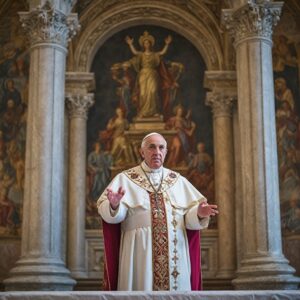
Highlights:
– Ukraine is considering adopting Bitcoin as a national reserve asset.
– Legal challenges may delay the adoption process.
– Mixed reactions are emerging within Ukraine’s crypto industry.
Ukraine’s Potential Shift to Bitcoin Reserves
In a groundbreaking move, Ukraine is contemplating embracing Bitcoin as a national reserve asset, aiming to enhance its financial stability amidst the backdrop of the ongoing conflict with Russia. The proposal, currently in its final stages, was disclosed by Member of Parliament Yaroslav Zhelezniak during the CRYPTO 2025 conference in Kyiv on Feb. 6. This initiative aligns with a global trend that gained momentum after former US President Donald Trump’s executive order in March 2024 to establish a national Bitcoin reserve using confiscated BTC.
Swedish MP Rickard Nordin’s public letter urging the consideration of Bitcoin as a national reserve due to its perceived inflation-hedging capabilities further spotlights the increasing international attention towards cryptocurrencies for national reserves. These developments underscore the evolving landscape where countries are exploring unconventional assets to diversify their reserves beyond conventional fiat currencies.
Exploring the Legal and Regulatory Hurdles
Despite the potential benefits of Ukraine’s move towards a Bitcoin reserve, legal complexities may pose significant challenges. Kyrylo Khomiakov from Binance acknowledges the ambition behind this strategic crypto reserve but emphasizes the need for substantial legal amendments. The establishment of such a reserve demands a clear regulatory framework, which could potentially enhance the regulatory clarity around cryptocurrencies in Ukraine, suggesting a notable shift in the country’s stance towards digital assets.
Parallelly, Ukraine’s ongoing efforts to legalize cryptocurrencies and propose taxation mechanisms for certain transactions reveal a multifaceted approach towards integrating digital assets into the financial ecosystem. However, not all stakeholders in Ukraine’s crypto sphere share the same optimism, with concerns raised about the country’s economic stability and the timing of such a proposal in the face of pressing socio-economic challenges.
Implications and Path Forward
The consideration of Bitcoin as a national reserve asset signifies a pivotal moment in Ukraine’s crypto journey, signaling a potential transformation in its financial strategy. While uncertainties loom regarding legal adaptations and economic feasibility, this move could pave the way for greater regulatory transparency and crypto adoption in the country. As Ukraine navigates through the complexities of integrating digital assets into its financial landscape, questions arise about the broader impact on the crypto industry, regulatory paradigms, and the country’s economic trajectory.
In conclusion, Ukraine’s exploration of Bitcoin as a national reserve asset signifies a bold step towards reshaping its financial resilience. As the nation grapples with both legal and economic challenges in this endeavor, the outcome of this deliberation could set a precedent for other countries considering similar strategies. How might this move influence global perceptions of cryptocurrency adoption by governments? What lessons can be drawn from Ukraine’s approach for other nations seeking to leverage digital assets in their financial strategies?
Editorial content by Avery Redwood

















